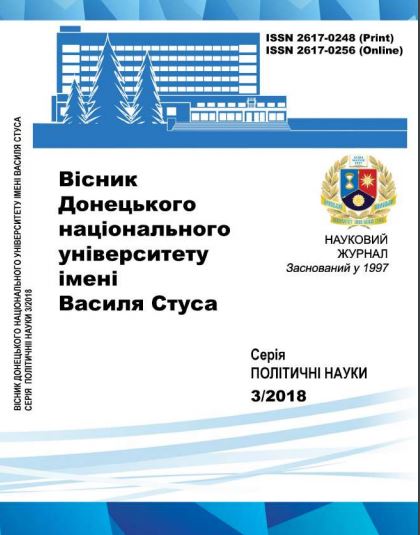UN transitional administration as the first stage of state building.
DOI:
https://doi.org/10.31558/2617-0248.2018.3.7Keywords:
transitional administration, peacekeeping operation, territorial integrity, right of peoples to self-determinationAbstract
The experience and implications of the introduction of the transitional administration within the framework of UN peacekeeping operations have been analyzed. In Cambodia, the main task of the transitional administration, established by the UN Security Council resolution in 1992, was the holding of election, which resulted in a change in the state structure and the end of a long civil war.
In Croatia, the introduction of the transitional administration in 1995 was foreseen by a peace agreement between the government and representatives of the Serbs who participated in the creation of the self-proclaimed Republic of Serbian Krajina, to monitor the process of demilitarization and to implement the plan for the peaceful reintegration of the region. The peacekeeping mission was successfully completed in 1998 without changing the state borders.
The actual liberation of Kosovo’s territory from the Yugoslav Army as a result of NATO’s military operation in 1999 allowed the UN Security Council to adopt a resolution on a transitional administration that was supposed to ensure security, stability, human rights and promote the formation of the main institutions of the state. After the declaration of independence in 2008, the mandate of the peacekeeping mission has been changed, but the territory remains a potential source of instability in the region.
Established in 1999, the transitional administration in East Timor contributed to the implementation of the results of the referendum, in which the majority of the residents voted for separation from Indonesia. The emergence of a new state in 2002 led to changes in the mandate of a peacekeeping mission, which lasted until 2012 in various forms.
Common for the last three cases is the presence of civil (administrative) and military (force) components in the UN peacekeeping operation. It is established that the activity of such an authority in the territory of certain regions of the country, which is not controlled by the government, inevitably leads to the creation of new states and the loss of territorial integrity, which is not in the interests of Ukraine in resolving the conflict in Donbass.
References
Report of the Secretary-General on the United Nations transitional administration for Eastern Slavonia, Baranja and Western Sirmium. [Електронний ресурс]. – Режим доступу: http://daccess-ods.un.org/access.nsf/Get?Open&DS=S/1997/767&Lang=E.
Resolution 1145 (1997) Adopted by the Security Council at its 3843rd meeting. on 19 December 1997 S/RES/1145 (1997). [Електронний ресурс]. – Режим доступу: http://undocs.org/en/S/RES/1145(1997).
Resolution 1272 (1999) Adopted by the Security Council at its 4057th meeting, on 25 October 1999. S/RES/1272 (1999). [Електронний ресурс]. – Режим доступу:http://undocs.org/en/S/RES/1272(1999).
Security Council, 54th year: 4011th meeting, Thursday, 10 June 1999, New York, S/PV.4011. [Електронний ресурс]. – Режим доступу: http://daccess-ods.un.org/access.nsf/Get?Open&DS=S/PV.4011&Lang=E.
United Nations Transitional authority in Eastern Slavonia, Barnaja and Western Sirmium. [Електронний ресурс]. – Режим доступу: https://peacekeeping.un.org/ru/mission/past/untaes.htm.

